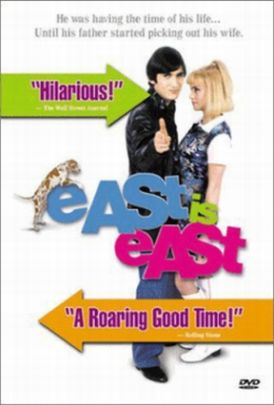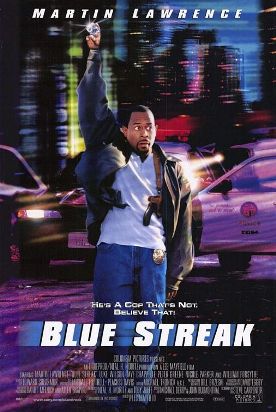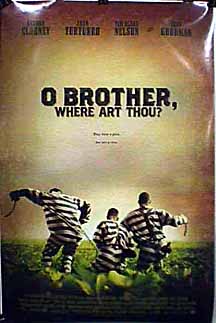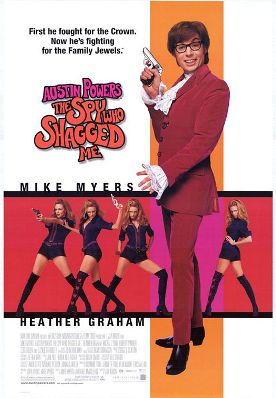East is East
East is East by Damien O’Donnell, from a script by Ayub Khan-Din, is worth seeing because of its wry look at the culture clash between East and West in a working class area of Leeds, West Yorkshire, in the early 1970s, and for the terrific performance of Om Puri in the role of the Pakistani patriarch, George Khan. George is in some ways the Tony Soprano of Britain, as he has to come to terms with the steady erosion in an alien culture of almost everything he has tried to preserve of his Pakistani heritage—especially his patriarchal (as the feminists have taught us to call it) authority. Of course these immigrants are more recent and not involved in criminal activities, but the essential similarity is that both Tony Soprano and George Khan are romantics and traditionalists, people who believe in the values of the culture they represent, yet who find themselves more or less powerless to resist the competing and ultimately triumphant values of liberal, multicultural Western democracy and consumer culture.
In both cases, too, the infection of these alien values gains its ascendancy over the host organism by attacking the family. Both the Pakistani and the Italian-American pride themselves on devotion to family. But the family means primarily the kids, who are inevitably part of a youth culture which demands quite different allegiances. All the old symbols and rituals and sacred things mean little to these kids. The film begins with a Catholic procession through the streets that the Muslim Khan kids join in, even carrying the large crucifix before the priest. It’s presumably just a neighborhood party to them. But as soon as they see their dad they realize they have to duck out of the festivities immediately—even though it means they take the crucifix with them.
It shows that they still love and respect the old man and don’t want to hurt him, but can’t begin to understand or share his way of looking at the world. To a lesser extent, this is also true of George’s English wife and the mother of his children, Ella (Linda Bassett). She represents the point of contact between the old Pakistani and the old English culture, which at least share certain ideas of masculine prerogatives and female submission in marriage. Ella would find it as bizarre as George would to treat their marriage as an equal partnership, and at the one point in the film where he strikes her, the male frustration and sense of entitlement—and her submission to it—seems to have lost all its ethnic and therefore alien character. This could be any husband of Leeds, 1971, and any wife.
Likewise, their joking about George’s first wife, back in Pakistan, and his threats to bring her into the household polygamously is more English than Pakistani—because it is so obviously a joke, as much to George as to Ella. “What’s problem? First wife always treat second wife like sister,” says George, teasingly. It suggests that at some level he recognizes that he is more British than Pakistani now, though he resists admitting it wherever he can. It is in the light moments, where the jokes have a recognizable Yorkshire cast to them, that we see this. We learn, for instance, that when George first came to England he had a part as an extra in a film, playing a Pathan or Afghan warrior, a part which called on him to cry out in bloodcurdling fashion: “Kill the English.” The whole family laughs at this as a good joke.
You get the point rather early on. I would grumble a bit about the film’s relentless pursuit of its thesis, so that right after the procession at the beginning, we move on to the arranged marriage of Nazir (Ian Aspinal), the Khans’ oldest son. At the last minute Nazir announces that he cannot go through with the wedding and skips out of the mosque and out of the family, as George, in his old-fashioned, patriarchal way announces that he is dead to them. But of course he has only gone to London, re-styled himself “Mr Nigel” and opened with his gay lover a chic boutique dealing in women’s shoes. Naturally, Ella and the other kids secretly keep in touch with him. Then there is another attempt at arranged marriage, so that, presumably, each of the other kids can in turn (though in different ways) proclaim the need for independence and Englishness and the triumphant youth culture that George will have eventually to accept.
Though it has affection for George, the film is so completely on the side of the levelling forces at work destroying his traditions that there is a certain one-dimensionality about it. But along the way we do get some wonderfully comic moments. One favorite moment of mine in the film comes with the nice irony of seeing George’s kids lounging in front of the television and eating pork sausages as they watch Enoch Powell, the great hero of the anti-immigration forces in Britain (such as they were) at the time. Powell’s fulminations against the alien culture in Britain’s midst washes over them, leaving them completely oblivious, but when they hear dad coming home from the chip shop, they are panicked and desperate to get the smell of the sausages out of house before he can tell what they’ve been up to.
The kids have even unself-consciously picked up the casual ambient racism that Powell was appealing to, and Tariq (Jimi Mistry) firmly announces that “I’m not marrying a f***ing Paki!” The real threat, O’Donnell’s film argues, was and is not to Britain from the immigrants, but to the immigrants from Britain. In fact, of course, it works both ways. And the film takes the youth culture so much for granted that it doesn’t look properly at the ways in which it threatens both the Pakistani and the British identities. But it is fair enough for him to concentrate, within its rather narrow scope, on the many ways in which this particular traditional, Muslim and Asian culture is being effaced, not by the British but by the new, American influenced international culture that Benjamin Barber calls McWorld.
Discover more from James Bowman
Subscribe to get the latest posts to your email.







